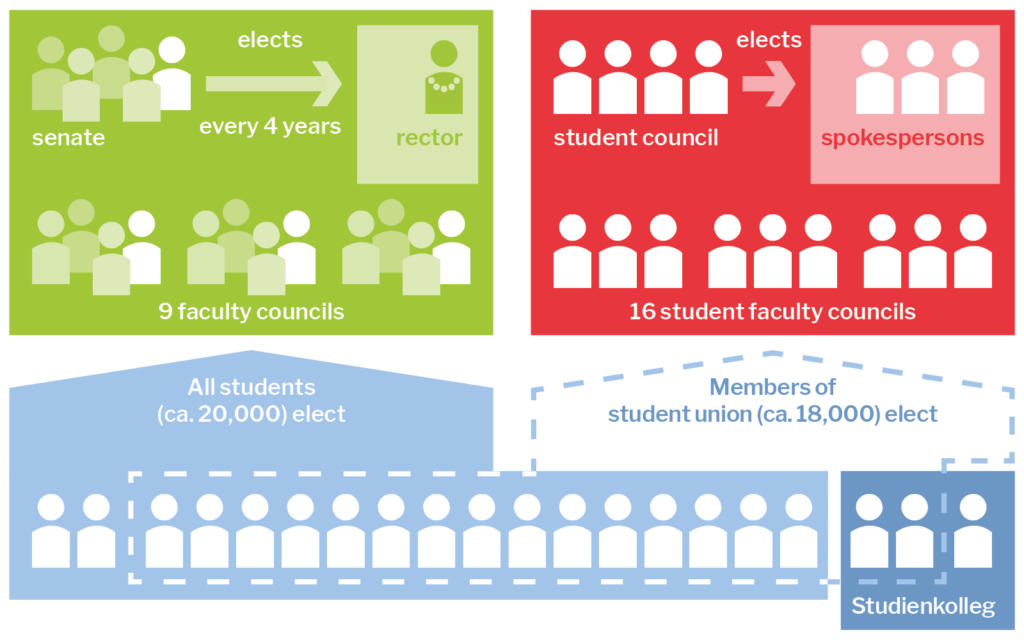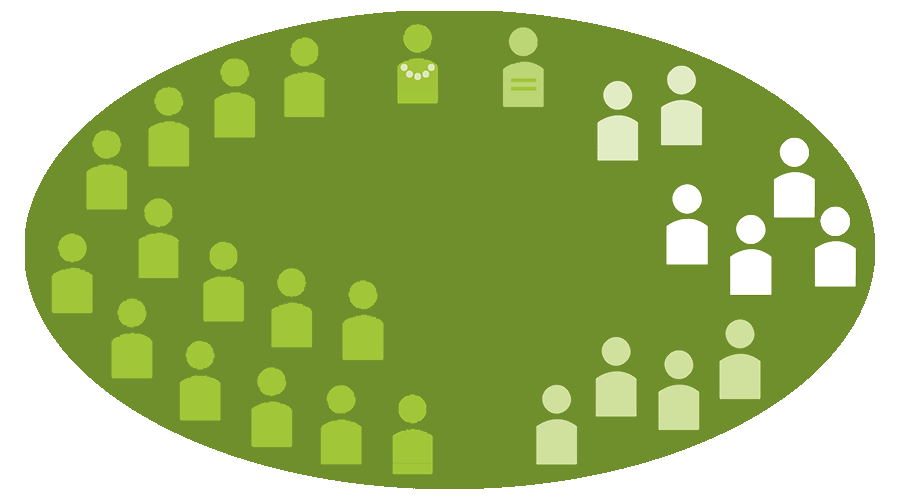Unaffected by privacy concerns, the student council is going along with the date and method set by the university for their campus elections. Here is what the polls are about and what to keep an eye on.
- Diesen Artikel auf Deutsch lesen
- This article has been updated from the printed version with some current information.
“Online elections are crap”, said Johannes Kohl from the political campus group Offene Linke Liste, voicing his concern. According to him, the student faculty council of Maths/Informatics had previously elaborated on why voting through an online service provider was “a really stupid idea”. He added that elections on federal, state, and local levels were still being held on ballot papers for a reason. And he believed that this year, with the pandemic waning, they were accepting the inherent privacy issues without necessity.
However, Johannes failed to convince anyone in the student council meeting on 27 February to oppose holding jointly organised elections of the student union and the university. While some council members acknowledged his concerns, there just seemed to be no feasible alternative. For their governing bodies, Martin Luther University had already committed to online voting once again, although they plan to change from Polyas to some other service provider. Consequently, the student union’s election committee would have been solely in charge of organising an on-site election with paper ballots, printed electoral lists, sealed ballot boxes, a number of polling sites, optional postal voting, and many volunteers.
With 21 votes in favour, one against, and no abstentions, the student council decided to join the student union’s elections with the university’s online elections. Even so, the council’s presiding spokesmen, Anton Borrmann and Jan-Niklas Reiche, want to propose that the university return to the conventional voting method next year.

Diagram: Konrad Dieterich
Once a Year …
… the student members in the bodies called Senat (senate), Fakultätsrat (faculty council), Studierendenrat (student council), and Fachschaftsrat (faculty student council) are elected anew. This year’s voting will take place from 30 May to 7 June 2023. There is a benefit in organising it online: As polling can proceed with hardly any staff, it can stay open for a longer period. Now, what are these bodies for and how exactly do the elections take place?
In German, “Gremium” can refer to a board, governing body, or committee, and denotes an association or a collaboration of people with the purpose of fulfilling certain tasks or taking certain decisions. At MLU there are university bodies and student bodies — the senate and nine faculty councils belong to the university. In each of them, several status groups come together: professors, academic staff, students, and non-academic staff (for example, administrative or library employees). The term of student members is one year; deputies of the other groups are elected every two or four years.
Student bodies — the student council and student faculty councils — are elected and filled exclusively by members of the student union. This means that all enrolled students are eligible as long as they have paid their student union fee of 11.95 Euro, which is usually included in the semester fee.
Within the bodies, some campus groups represent political orientations, provide nominees, and unite politically motivated students. On the ballot slips these campus groups can be recognised by their names. However, not all nomination lists can be attributed to a partisan political orientation and there is no need to be affiliated to any campus group in order to run as a nominee.
Lost (& Found) in Translation
Studierendenschaft (f.) is often translated as “student body”, as it generally means the entire group of students within a particular university, or even beyond. However, the translator settled on “student union” because a Verfasste Studierendenschaft is a legal entity attached to its university, as constituted in the Higher Education Acts of most German states, and students are members of it. This choice of words should also help avoid the ambiguity of “body”, which can refer both to a large group of people and a governing organisation with dedicated tasks.
Elected Uni Bodies
The senate is the highest decision-making body of the university. Its tasks include deciding on study and examination regulations, the draft budget, and cooperation agreements — it determines all fundamental matters of the university. Plans on the future direction of the university, which come down to cutting courses and chairs, have been adopted by the senate in the past year, too. For specific tasks, the senate has established several commissions. Meanwhile, many other organisational issues are within the authority of the rector’s office, which serves as the executive body of the university.
Tasks of a faculty council include for example proposing new professors for vacant chairs as well as deciding on study and examination regulations within their respective area of disciplines. Meanwhile, many other organisational issues are within the authority of the deans’ offices, which serve as the executive body of the faculties.
Both in the senate and in the faculty councils, seats are allocated to the university’s member groups in a fixed ratio. This ensures a majority for professors, while students and academic staff each receive just short of a sixth of the seats, and non-academic staff close to a twelfth. An absolute majority of seats and votes for professors is stipulated in the Higher Education Act of Saxony-Anhalt and has been repeatedly criticised by the other member groups as undemocratic, most recently during the student plenary meeting on 27 June 2022.

Diagram: Konrad Dieterich
Elected Student Bodies
The Studierendenrat (student council, often referred to as Stura), and the Fachschaftsräte (student faculty councils) are bodies representing purely student interests. Much like faculties are organisational subdivisions of the university, the Studierendenschaft (student union) is comprised of Fachschaften. These student faculties roughly correspond to the faculties or electoral areas of the university, with some variations. As members of the student union, students are members of a Fachschaft, too.
Within some of these student faculties, institute groups have emerged; these are, however, no official bodies of the student union and are more akin to student working groups supported by their respective student faculty council. They will not be on the ballot in the elections.
Beyond representing their members’ interests in the field of higher education policy, the bodies of the student union are supposed to address the academic, social, and financial needs and issues of their members. In other words, not only do they act as a student mouthpiece to the university, state politicians, and the general public, but they also assist with practical issues, such as legal advice and other forms of counselling, a hardship fund, and a childcare room. In addition, they organise events and activities and sponsor projects of students. Student faculty councils offer assistance and intervention in case of specific study-related problems, too.
Both the student council and the student faculty councils are entirely composed of students who are members of the student union. Half of the representatives in the student council are elected at-large, with nominees from the student union as a whole, whereas the other half are determined through electoral constituencies consisting of one or more student faculties. For specific tasks, the student council elects a number of spokespersons and can also appoint officers and establish working groups which are open to non-elected students.
The Stura of the MLU, together with three more student councils (of Burg Giebichenstein, Merseburg, and Anhalt), exerts some influence on the Studentenwerk Halle. This public organisation offers a range of student services in the region, including cafeterias and dormitories. Each Stura gets to appoint one of the student members in the Studentenwerk’s board of administration.
Studienkolleg
The Landesstudienkolleg (preparatory college of Saxony-Anhalt) is an educational institution providing international students with additional knowledge and skills prior to their regular enrolment. Collegians cannot participate in the university’s elections for senate and the faculty councils. They can, however, run for a seat in the Studierendenrat and the Fachschaftsrat of Neuphilologien/Studienkolleg, and cast their votes, too. By the time they come into office, the elected nominees will be no longer in the Studienkolleg but can still represent the interests of the new Collegians. Hence it makes most sense to run if they plan to enrol at MLU.

Diagram: Konrad Dieterich
This will Happen Next
Notices of Election issued by the university and the student union give detailed information on the preparation and further steps of the campus elections. Here are the key points in brief:
Voters are automatically registered. They can confirm their eligibility (Wahlberechtigung) through the self-service Löwenportal. This is particularly relevant if students are involved with more than one faculty or electoral area based on their combination of courses.
From mid-May, accepted nomination lists for the various bodies are announced. The lists will be posted in several places of the university as well as on the websites of the student union’s election committee and the university’s election office.
“Mahlowat”: The Stura has prepared an election compass to help voters find a campus group that matches their interest. It should be considered that the propositions cannot cover all topics and that there are candidates on the ballot that do not belong to any of the featured campus groups. Therefore, it may be a good idea to take the results of the compass with a grain of salt.
25 May, 6:30 pm to ca. 8:00 pm: The “Löwenrunde”, a public presentation by the student council’s election committee, gives an overview of the upcoming campus election. Furthermore, campus groups present their topics in a panel discussion which is open to contributions from the audience. The event takes place in hall XXIII (Audimax) but is also live-streamed and subsequently available as a recording.
30 May, 10:00 am to 7 June 2023, 3:00 pm: Elections. After logging into the Löwenportal, students can cast their votes online for both the university’s and the student union’s bodies. The ballots will indicate how many votes the eligible voter can cast for the respective body. It is possible to split the votes on more than one nomination list and to cast up to two votes for one person. The ballot will be invalid if more than the admissible number of votes are cast. Should there be not enough candidates running for a particular body to choose from, names of eligible students may be entered in the provided fields.
1 September 2023: The term for the elected student members of the senate and the faculty councils begins. It is starting on 1 October for the student council, and on various days for the student faculty councils.
Text: Konrad Dieterich, Renja-Arlene Dietze
Translation: Konrad Dieterich
Featured image: Marlene Nötzold
